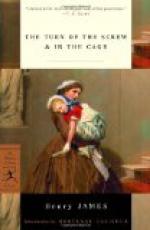circumstance to which little required to be added—as
if the bearing of such an item on her life might easily
be grasped. Perhaps it was the wonder of whether
Lord Rye wished to marry her that made her guest,
with thoughts straying to that quarter, quite determine
that some other nuptials also should take place at
Saint Julian’s. Mr. Mudge was still an
attendant at his Wesleyan chapel, but this was the
least of her worries—it had never even
vexed her enough for her to so much as name it to Mrs.
Jordan. Mr. Mudge’s form of worship was
one of several things—they made up in superiority
and beauty for what they wanted in number—that
she had long ago settled he should take from her,
and she had now moreover for the first time definitely
established her own. Its principal feature was
that it was to be the same as that of Mrs. Jordan and
Lord Rye; which was indeed very much what she said
to her hostess as they sat together later on.
The brown fog was in this hostess’s little parlour,
where it acted as a postponement of the question of
there being, besides, anything else than the teacups
and a pewter pot and a very black little fire and a
paraffin lamp without a shade. There was at any
rate no sign of a flower; it was not for herself Mrs.
Jordan gathered sweets. The girl waited till
they had had a cup of tea—waited for the
announcement that she fairly believed her friend had,
this time, possessed herself of her formally at last
to make; but nothing came, after the interval, save
a little poke at the fire, which was like the clearing
of a throat for a speech.
CHAPTER XXV
“I think you must have heard me speak of Mr.
Drake?” Mrs. Jordan had never looked so queer,
nor her smile so suggestive of a large benevolent
bite.
“Mr. Drake? Oh yes; isn’t he a friend
of Lord Rye?”
“A great and trusted friend. Almost—I
may say—a loved friend.”
Mrs. Jordan’s “almost” had such
an oddity that her companion was moved, rather flippantly
perhaps, to take it up. “Don’t people
as good as love their friends when they I trust them?”
It pulled up a little the eulogist of Mr. Drake.
“Well, my dear, I love you—”
“But you don’t trust me?” the girl
unmercifully asked.
Again Mrs. Jordan paused—still she looked
queer. “Yes,” she replied with a
certain austerity; “that’s exactly what
I’m about to give you rather a remarkable proof
of.” The sense of its being remarkable
was already so strong that, while she bridled a little,
this held her auditor in a momentary muteness of submission.
“Mr. Drake has rendered his lordship for several
years services that his lordship has highly appreciated
and that make it all the more—a—unexpected
that they should, perhaps a little suddenly, separate.”
“Separate?” Our young lady was mystified,
but she tried to be interested; and she already saw
that she had put the saddle on the wrong horse.
She had heard something of Mr. Drake, who was a member
of his lordship’s circle—the member
with whom, apparently, Mrs. Jordan’s avocations
had most happened to throw her. She was only
a little puzzled at the “separation.”
“Well, at any rate,” she smiled, “if
they separate as friends—!”




